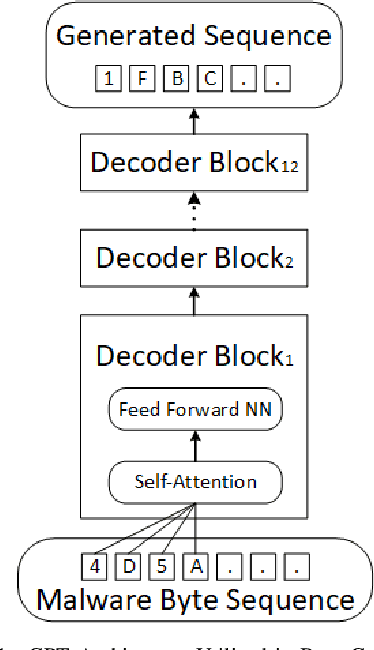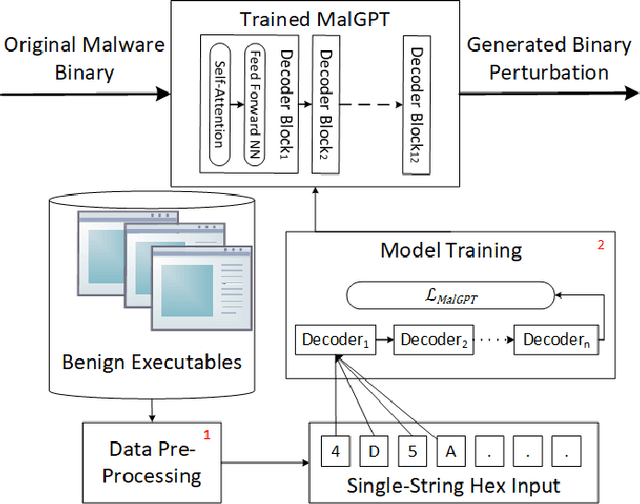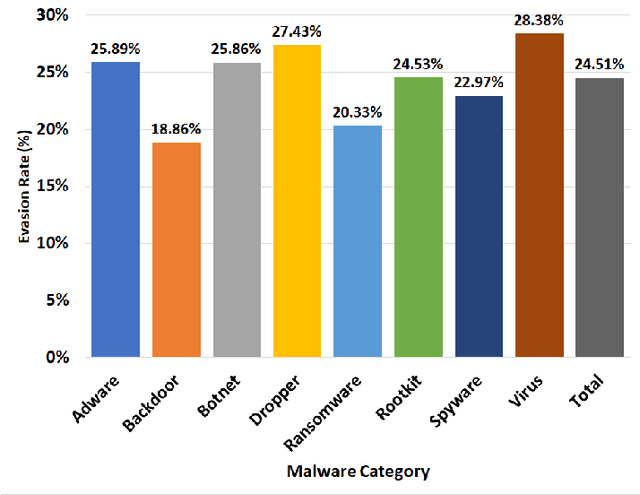James Lee Hu
Evading Deep Learning-Based Malware Detectors via Obfuscation: A Deep Reinforcement Learning Approach
Feb 04, 2024



Abstract:Adversarial Malware Generation (AMG), the generation of adversarial malware variants to strengthen Deep Learning (DL)-based malware detectors has emerged as a crucial tool in the development of proactive cyberdefense. However, the majority of extant works offer subtle perturbations or additions to executable files and do not explore full-file obfuscation. In this study, we show that an open-source encryption tool coupled with a Reinforcement Learning (RL) framework can successfully obfuscate malware to evade state-of-the-art malware detection engines and outperform techniques that use advanced modification methods. Our results show that the proposed method improves the evasion rate from 27%-49% compared to widely-used state-of-the-art reinforcement learning-based methods.
Multi-view Representation Learning from Malware to Defend Against Adversarial Variants
Oct 25, 2022Abstract:Deep learning-based adversarial malware detectors have yielded promising results in detecting never-before-seen malware executables without relying on expensive dynamic behavior analysis and sandbox. Despite their abilities, these detectors have been shown to be vulnerable to adversarial malware variants - meticulously modified, functionality-preserving versions of original malware executables generated by machine learning. Due to the nature of these adversarial modifications, these adversarial methods often use a \textit{single view} of malware executables (i.e., the binary/hexadecimal view) to generate adversarial malware variants. This provides an opportunity for the defenders (i.e., malware detectors) to detect the adversarial variants by utilizing more than one view of a malware file (e.g., source code view in addition to the binary view). The rationale behind this idea is that while the adversary focuses on the binary view, certain characteristics of the malware file in the source code view remain untouched which leads to the detection of the adversarial malware variants. To capitalize on this opportunity, we propose Adversarially Robust Multiview Malware Defense (ARMD), a novel multi-view learning framework to improve the robustness of DL-based malware detectors against adversarial variants. Our experiments on three renowned open-source deep learning-based malware detectors across six common malware categories show that ARMD is able to improve the adversarial robustness by up to seven times on these malware detectors.
Single-Shot Black-Box Adversarial Attacks Against Malware Detectors: A Causal Language Model Approach
Dec 03, 2021



Abstract:Deep Learning (DL)-based malware detectors are increasingly adopted for early detection of malicious behavior in cybersecurity. However, their sensitivity to adversarial malware variants has raised immense security concerns. Generating such adversarial variants by the defender is crucial to improving the resistance of DL-based malware detectors against them. This necessity has given rise to an emerging stream of machine learning research, Adversarial Malware example Generation (AMG), which aims to generate evasive adversarial malware variants that preserve the malicious functionality of a given malware. Within AMG research, black-box method has gained more attention than white-box methods. However, most black-box AMG methods require numerous interactions with the malware detectors to generate adversarial malware examples. Given that most malware detectors enforce a query limit, this could result in generating non-realistic adversarial examples that are likely to be detected in practice due to lack of stealth. In this study, we show that a novel DL-based causal language model enables single-shot evasion (i.e., with only one query to malware detector) by treating the content of the malware executable as a byte sequence and training a Generative Pre-Trained Transformer (GPT). Our proposed method, MalGPT, significantly outperformed the leading benchmark methods on a real-world malware dataset obtained from VirusTotal, achieving over 24.51\% evasion rate. MalGPT enables cybersecurity researchers to develop advanced defense capabilities by emulating large-scale realistic AMG.
 Add to Chrome
Add to Chrome Add to Firefox
Add to Firefox Add to Edge
Add to Edge